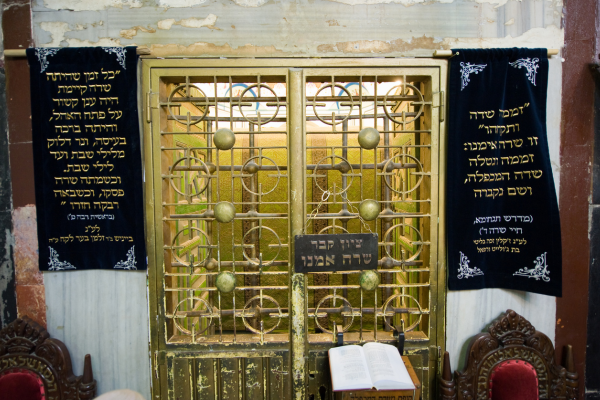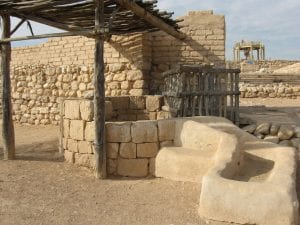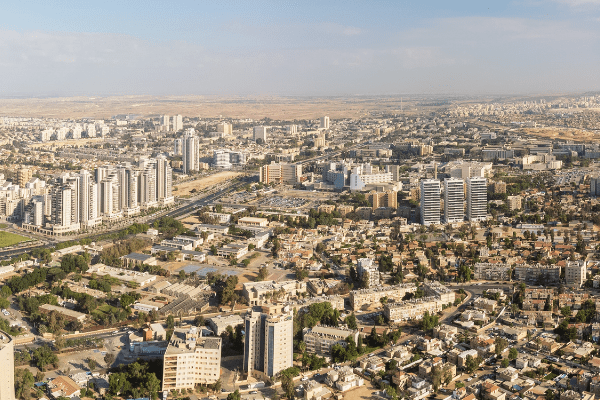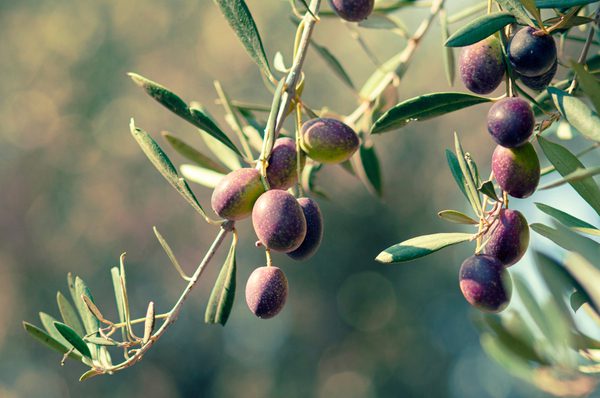
TORAH
NEVI'IM
KETUVIM
Chapter 21
Translation and Transliteration of
Listen to this chapter in Hebrew:
- Commentary
- Buy E-book
- Buy the Israel Bible
1Hashem took note of Sara as He had promised, and Hashem did for Sara as He had spoken.
אוַיהֹוָה פָּקַד אֶת־שָׂרָה כַּאֲשֶׁר אָמָר וַיַּעַשׂ יְהֹוָה לְשָׂרָה כַּאֲשֶׁר דִּבֵּר׃
2Sara conceived and bore a son to Avraham in his old age, at the set time of which Hashem had spoken.
בוַתַּהַר וַתֵּלֶד שָׂרָה לְאַבְרָהָם בֵּן לִזְקֻנָיו לַמּוֹעֵד אֲשֶׁר־דִּבֶּר אֹתוֹ אֱלֹהִים׃
3Avraham gave his newborn son, whom Sara had borne him, the name of Yitzchak.
גוַיִּקְרָא אַבְרָהָם אֶת־שֶׁם־בְּנוֹ הַנּוֹלַד־לוֹ אֲשֶׁר־יָלְדָה־לּוֹ שָׂרָה יִצְחָק׃
4And when his son Yitzchak was eight days old, Avraham circumcised him, as Hashem had commanded him.
דוַיָּמָל אַבְרָהָם אֶת־יִצְחָק בְּנוֹ בֶּן־שְׁמֹנַת יָמִים כַּאֲשֶׁר צִוָּה אֹתוֹ אֱלֹהִים׃
5Now Avraham was a hundred years old when his son Yitzchak was born to him.
הוְאַבְרָהָם בֶּן־מְאַת שָׁנָה בְּהִוָּלֶד לוֹ אֵת יִצְחָק בְּנוֹ׃
6Sara said, “Hashem has brought me laughter; everyone who hears will laugh with me.”
ווַתֹּאמֶר שָׂרָה צְחֹק עָשָׂה לִי אֱלֹהִים כָּל־הַשֹּׁמֵעַ יִצְחַק־לִי׃
7And she added, “Who would have said to Avraham That Sara would suckle children! Yet I have borne a son in his old age.”
זוַתֹּאמֶר מִי מִלֵּל לְאַבְרָהָם הֵינִיקָה בָנִים שָׂרָה כִּי־יָלַדְתִּי בֵן לִזְקֻנָיו׃
8The child grew up and was weaned, and Avraham held a great feast on the day that Yitzchak was weaned.
חוַיִּגְדַּל הַיֶּלֶד וַיִּגָּמַל וַיַּעַשׂ אַבְרָהָם מִשְׁתֶּה גָדוֹל בְּיוֹם הִגָּמֵל אֶת־יִצְחָק׃
9Sara saw the son whom Hagar the Egyptian had borne to Avraham playing.
טוַתֵּרֶא שָׂרָה אֶת־בֶּן־הָגָר הַמִּצְרִית אֲשֶׁר־יָלְדָה לְאַבְרָהָם מְצַחֵק׃
10She said to Avraham, “Cast out that slave-woman and her son, for the son of that slave shall not share in the inheritance with my son Yitzchak.”
יוַתֹּאמֶר לְאַבְרָהָם גָּרֵשׁ הָאָמָה הַזֹּאת וְאֶת־בְּנָהּ כִּי לֹא יִירַשׁ בֶּן־הָאָמָה הַזֹּאת עִם־בְּנִי עִם־יִצְחָק׃
11The matter distressed Avraham greatly, for it concerned a son of his.
יאוַיֵּרַע הַדָּבָר מְאֹד בְּעֵינֵי אַבְרָהָם עַל אוֹדֹת בְּנוֹ׃
12But Hashem said to Avraham, “Do not be distressed over the boy or your slave; whatever Sara tells you, do as she says, for it is through Yitzchak that offspring shall be continued for you.
יבוַיֹּאמֶר אֱלֹהִים אֶל־אַבְרָהָם אַל־יֵרַע בְּעֵינֶיךָ עַל־הַנַּעַר וְעַל־אֲמָתֶךָ כֹּל אֲשֶׁר תֹּאמַר אֵלֶיךָ שָׂרָה שְׁמַע בְּקֹלָהּ כִּי בְיִצְחָק יִקָּרֵא לְךָ זָרַע׃
13As for the son of the slave-woman, I will make a nation of him, too, for he is your seed.”
יגוְגַם אֶת־בֶּן־הָאָמָה לְגוֹי אֲשִׂימֶנּוּ כִּי זַרְעֲךָ הוּא׃
14Early next morning Avraham took some bread and a skin of water, and gave them to Hagar. He placed them over her shoulder, together with the child, and sent her away. And she wandered about in the wilderness of Be'er Sheva.
ידוַיַּשְׁכֵּם אַבְרָהָם בַּבֹּקֶר וַיִּקַּח־לֶחֶם וְחֵמַת מַיִם וַיִּתֵּן אֶל־הָגָר שָׂם עַל־שִׁכְמָהּ וְאֶת־הַיֶּלֶד וַיְשַׁלְּחֶהָ וַתֵּלֶךְ וַתֵּתַע בְּמִדְבַּר בְּאֵר שָׁבַע׃
15When the water was gone from the skin, she left the child under one of the bushes,
טווַיִּכְלוּ הַמַּיִם מִן־הַחֵמֶת וַתַּשְׁלֵךְ אֶת־הַיֶּלֶד תַּחַת אַחַד הַשִּׂיחִם׃
16and went and sat down at a distance, a bowshot away; for she thought, “Let me not look on as the child dies.” And sitting thus afar, she burst into tears.
טזוַתֵּלֶךְ וַתֵּשֶׁב לָהּ מִנֶּגֶד הַרְחֵק כִּמְטַחֲוֵי קֶשֶׁת כִּי אָמְרָה אַל־אֶרְאֶה בְּמוֹת הַיָּלֶד וַתֵּשֶׁב מִנֶּגֶד וַתִּשָּׂא אֶת־קֹלָהּ וַתֵּבְךְּ׃
17Hashem heard the cry of the boy, and an angel of Hashem called to Hagar from heaven and said to her, “What troubles you, Hagar? Fear not, for Hashem has heeded the cry of the boy where he is.
יזוַיִּשְׁמַע אֱלֹהִים אֶת־קוֹל הַנַּעַר וַיִּקְרָא מַלְאַךְ אֱלֹהִים אֶל־הָגָר מִן־הַשָּׁמַיִם וַיֹּאמֶר לָהּ מַה־לָּךְ הָגָר אַל־תִּירְאִי כִּי־שָׁמַע אֱלֹהִים אֶל־קוֹל הַנַּעַר בַּאֲשֶׁר הוּא־שָׁם׃
18Come, lift up the boy and hold him by the hand, for I will make a great nation of him.”
יחקוּמִי שְׂאִי אֶת־הַנַּעַר וְהַחֲזִיקִי אֶת־יָדֵךְ בּוֹ כִּי־לְגוֹי גָּדוֹל אֲשִׂימֶנּוּ׃
19Then Hashem opened her eyes and she saw a well of water. She went and filled the skin with water, and let the boy drink.
יטוַיִּפְקַח אֱלֹהִים אֶת־עֵינֶיהָ וַתֵּרֶא בְּאֵר מָיִם וַתֵּלֶךְ וַתְּמַלֵּא אֶת־הַחֵמֶת מַיִם וַתַּשְׁקְ אֶת־הַנָּעַר׃
20Hashem was with the boy and he grew up; he dwelt in the wilderness and became a bowman.
כוַיְהִי אֱלֹהִים אֶת־הַנַּעַר וַיִּגְדָּל וַיֵּשֶׁב בַּמִּדְבָּר וַיְהִי רֹבֶה קַשָּׁת׃
21He lived in the wilderness of Paran; and his mother got a wife for him from the land of Egypt.
כאוַיֵּשֶׁב בְּמִדְבַּר פָּארָן וַתִּקַּח־לוֹ אִמּוֹ אִשָּׁה מֵאֶרֶץ מִצְרָיִם׃
22At that time Abimelech and Phicol, chief of his troops, said to Avraham, “Hashem is with you in everything that you do.
כבוַיְהִי בָּעֵת הַהִוא וַיֹּאמֶר אֲבִימֶלֶךְ וּפִיכֹל שַׂר־צְבָאוֹ אֶל־אַבְרָהָם לֵאמֹר אֱלֹהִים עִמְּךָ בְּכֹל אֲשֶׁר־אַתָּה עֹשֶׂה׃
23Therefore swear to me here by Hashem that you will not deal falsely with me or with my kith and kin, but will deal with me and with the land in which you have sojourned as loyally as I have dealt with you.”
כגוְעַתָּה הִשָּׁבְעָה לִּי בֵאלֹהִים הֵנָּה אִם־תִּשְׁקֹר לִי וּלְנִינִי וּלְנֶכְדִּי כַּחֶסֶד אֲשֶׁר־עָשִׂיתִי עִמְּךָ תַּעֲשֶׂה עִמָּדִי וְעִם־הָאָרֶץ אֲשֶׁר־גַּרְתָּה בָּהּ׃
24And Avraham said, “I swear it.”
כדוַיֹּאמֶר אַבְרָהָם אָנֹכִי אִשָּׁבֵעַ׃
25Then Avraham reproached Abimelech for the well of water which the servants of Abimelech had seized.
כהוְהוֹכִחַ אַבְרָהָם אֶת־אֲבִימֶלֶךְ עַל־אֹדוֹת בְּאֵר הַמַּיִם אֲשֶׁר גָּזְלוּ עַבְדֵי אֲבִימֶלֶךְ׃
26But Abimelech said, “I do not know who did this; you did not tell me, nor have I heard of it until today.”
כווַיֹּאמֶר אֲבִימֶלֶךְ לֹא יָדַעְתִּי מִי עָשָׂה אֶת־הַדָּבָר הַזֶּה וְגַם־אַתָּה לֹא־הִגַּדְתָּ לִּי וְגַם אָנֹכִי לֹא שָׁמַעְתִּי בִּלְתִּי הַיּוֹם׃
27Avraham took sheep and oxen and gave them to Abimelech, and the two of them made a pact.
כזוַיִּקַּח אַבְרָהָם צֹאן וּבָקָר וַיִּתֵּן לַאֲבִימֶלֶךְ וַיִּכְרְתוּ שְׁנֵיהֶם בְּרִית׃
28Avraham then set seven ewes of the flock by themselves,
כחוַיַּצֵּב אַבְרָהָם אֶת־שֶׁבַע כִּבְשֹׂת הַצֹּאן לְבַדְּהֶן׃
29and Abimelech said to Avraham, “What mean these seven ewes which you have set apart?”
כטוַיֹּאמֶר אֲבִימֶלֶךְ אֶל־אַבְרָהָם מָה הֵנָּה שֶׁבַע כְּבָשֹׂת הָאֵלֶּה אֲשֶׁר הִצַּבְתָּ לְבַדָּנָה׃
30He replied, “You are to accept these seven ewes from me as proof that I dug this well.”
לוַיֹּאמֶר כִּי אֶת־שֶׁבַע כְּבָשֹׂת תִּקַּח מִיָּדִי בַּעֲבוּר תִּהְיֶה־לִּי לְעֵדָה כִּי חָפַרְתִּי אֶת־הַבְּאֵר הַזֹּאת׃
31Hence that place was called Be'er Sheva, for there the two of them swore an oath.
al KAYN ka-RA la-ma-KOM ha-HU b'-AYR SHA-va KEE SHAM nish-b'-U sh'-nay-HEM
לאעַל־כֵּן קָרָא לַמָּקוֹם הַהוּא בְּאֵר שָׁבַע כִּי שָׁם נִשְׁבְּעוּ שְׁנֵיהֶם׃
![]() 21:31 Hence that place was called Be’er Sheva
21:31 Hence that place was called Be’er Sheva

Abraham’s well in Beersheva
Avraham names the place where he entered the covenant with Abimelech Be’er Sheva. The name Be’er Sheva (באר שבע), is made up of two Hebrew words. Be’er (באר) means ‘well,’ hinting to the fact that this covenant acknowledged Avraham’s right to the water well. The second part of the word is made up of the root ש-ב-ע, which means both ‘seven’ and ‘oath.’ Thus, Be’er Sheva can mean either ‘well of the seven’ or ‘well of the oath.’ This double meaning hints both to the seven female sheep set aside by Avraham as verification of the oath, and to the oath taken with regard to the well itself.
32When they had concluded the pact at Be'er Sheva, Abimelech and Phicol, chief of his troops, departed and returned to the land of the Philistines.
לבוַיִּכְרְתוּ בְרִית בִּבְאֵר שָׁבַע וַיָּקָם אֲבִימֶלֶךְ וּפִיכֹל שַׂר־צְבָאוֹ וַיָּשֻׁבוּ אֶל־אֶרֶץ פְּלִשְׁתִּים׃
33[Avraham] planted a tamarisk at Be'er Sheva, and invoked there the name of Hashem, the Everlasting God.
va-yi-TA E-shel biv-AYR SHA-va va-YIK-ra SHAM b'-SHAYM a-do-NAI AYL o-LAM
לגוַיִּטַּע אֶשֶׁל בִּבְאֵר שָׁבַע וַיִּקְרָא־שָׁם בְּשֵׁם יְהֹוָה אֵל עוֹלָם׃
![]() 21:33 The name of Hashem, the Everlasting God
21:33 The name of Hashem, the Everlasting God
The Hebrew word used in this verse for everlasting is olam (עולם), which also means ‘world’ or ‘universe.’ The word olam is closely related to the word ne’elam (נעלם), meaning ‘hidden.’ The phrase “El Olam” (אל עולם), ‘Everlasting God,’ alludes to the fact that Hashem is also King over that which is hidden from us. God has specifically designed a world that is ruled by the laws of nature and hides His presence. It is up to man to see past His mask and reveal the Godliness that is hidden throughout the universe.
34And Avraham resided in the land of the Philistines a long time.
לדוַיָּגָר אַבְרָהָם בְּאֶרֶץ פְּלִשְׁתִּים יָמִים רַבִּים׃










